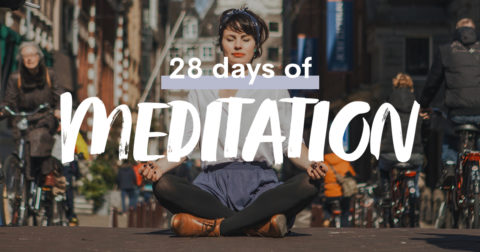
28 Days of Meditation: What I Learned
Like many of us, I used to live in a constant state of mental “busy-ness.” Every spare moment was filled with overthinking — from big life decisions to tiny things like what to cook for dinner. To break the cycle, I committed to meditating every day for 28 days. What started as an experiment quickly became one of the most impactful habits I’ve built.
The Biggest Changes I Noticed
-
Mini mental holidays: I stopped overthinking every spare moment and learned how to be present, especially on my commute. Instead of stressing, I noticed my surroundings — and felt calmer and more content.
-
Mindfulness in daily life: Meditation taught me that mindfulness isn’t just about sitting quietly; it’s about bringing presence to conversations, meals, and even washing the dishes.
-
Better decision-making: With less noise in my head, I tapped into intuition more easily and avoided overcomplicating things.
-
Mindful eating: Slowing down to taste food fully made meals more satisfying — and reduced mindless snacking.
-
More joy in yoga: I used to rush through the “hippy” parts. Now I understand how breath, body, and presence transform the practice.
-
Moments of calm (and even euphoria): By week four, I noticed longer stretches of calm and, occasionally, a surprising sense of joy and love.
And it’s not just personal. Neuroscience shows that meditation reduces cortisol (the stress hormone), strengthens focus, and boosts emotional regulation. Even 10 minutes a day can change how your brain responds to stress (Harvard Medical School, 2018).
Tips If You Want to Try It
-
Start small: Just 5–10 minutes a day. Apps like Headspace or Calm are great entry points.
-
Experiment with style: Breath, body scans, or sound-focused meditations — try a few and see what resonates.
-
Make it a habit: Pick a time and stick with it for at least a week. Consistency matters more than perfection.
-
Don’t judge yourself: Missing a day isn’t failure. Just keep coming back.
-
Go deeper when you’re ready: A longer session or group class can accelerate your understanding.
Final Thought
By the end of 28 days, meditation wasn’t a chore — it was a tool I could turn to anytime. It’s improved my stress, focus, relationships, and overall happiness. That’s why it’s not just monks or yogis using it; elite athletes, CEOs, and creatives all lean on meditation to stay clear, grounded, and at their best.
Most of all, it reminded me that being present is one of the simplest yet most powerful ways to change how life feels.
As Jon Kabat-Zinn puts it:
“In Asian languages, the word for ‘mind’ and the word for ‘heart’ are the same. If you’re not hearing mindfulness in some deep way as heartfulness, you’re not really understanding it.”


